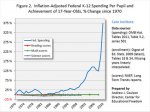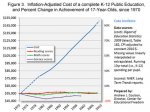David_N
DP Veteran
- Joined
- Sep 26, 2015
- Messages
- 6,562
- Reaction score
- 2,769
- Location
- The United States
- Gender
- Male
- Political Leaning
- Liberal
Did you read my list of benefits? If so, why is anyone living on $2/day? And you don't need college to get out of poverty, but you can always join the military and get it for free.
Btw, let's say there were no government programs and you were struggling and someone wrote you an $8,000 check, could you do something with that to maybe help yourself out of poverty? Could you buy a decent used car and a suit to go on job interviews? If it were me and someone gave me $8,000, I would be utterly floored! I would consider it a new lease on life.
You've dodged the costs of living and everything else.
Imagine you get $8000, now, factor in rent, a child, etc, etc, etc..$9,139
According to the College Board, the average cost of tuition and fees for the 2014–2015 school year was $31,231 at private colleges, $9,139 for state residents at public colleges, and $22,958 for out-of-state residents attending public universities.







